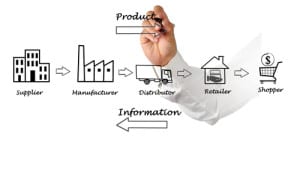
Could the blockchain be what supply chain partners need to reduce data redundancies and improve communication?
Supply chain is one of the most evolving areas in business technology, with trillions of purchase orders, invoices, certifications, and payments sent every day between companies.
In a lot of cases, suppliers and sellers have agreements on quality, speed, service levels and more, when one of these transactions doesn’t meet specification, it can cost both parties time and money to figure out the problem and come up with a timely solution.
According to Accenture, ten percent of freight invoices are problematic. These can include duplication, wrong freight mode changes, and incorrect fees. With the complex supply systems companies have, it can also take one side a while to figure out who is at fault.
See also: How blockchain and cognitive computing technologies work together
One solution to this ever-growing list of invoices and other pieces of certification is the blockchain. The open ledger has been cited a potential solution to a lot of the tech-worlds problems, and a new report suggests that it could significantly improve communication and understanding between supply chain partners.
Instead of having companies send thousands of documents at each other every day, all information would be stored on the blockchain. The transparent nature of the blockchain also removes the need to send a purchase order of materials, as the other party will know how much inventory the supplier has, what service level is required and the rate they will consume the material.
Using “smart contracts” of blockchain to detect infractions
Going further, the blockchain could also introduce “smart contracts” for business partners. These contracts detect infractions in the supply chain and prevent the record being entered, thus removing the need for a party to investigate what went wrong and how much is owed.
This puts the onus on the seller to correct bad invoices, not the purchaser. With the blockchain, all the information to correct is openly available and, if secure through encryption, cannot be tampered with by either party.
Another plus to the blockchain it is a single system, replicated for all partners. When a new partner joins, there is no need for a unique implementation process.
Your supply chain has changed an awful amount in the past decade, as Amazon and other marketplaces have made one-day shipping and other backend marvels the norm. But all of this additional data — delivery confirmations, transport order, inventory numbers, invoices — has led to major data redundancies across trading partner networks, something that could be reduced with the blockchain.
Adopting of the blockchain in the supply chain may take a while to come along, but early adopters could be looking at a decrease in redundancy and an increase in all of the things partners aspire towards when they first shake hands—communication and good contract standards.





